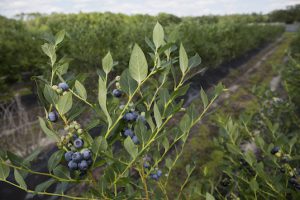
(Photo by Tyler Jones, UF/IFAS)
Research in the UF/IFAS soil and water sciences department aims to help Florida’s expanding blueberry operations while also conserving water. Dr. Davie Kadyampakeni, assistant professor of citrus water and nutrient management at the UF/IFAS Citrus Research and Education Center, is leading the effort. The goal: reduce groundwater irrigation by producing best management practices for using recycled wastewater in blueberry fields.
“We will evaluate reclaimed water (RW) use for blueberry irrigation,” Kadyampakeni explained, “while maintaining soil and environmental health and crop productivity.”
The UF/IFAS Dean for Research Office is funding the initial study with a $50,000 grant. The study calls for comparing blueberries irrigated with RW versus potable drinking water. This includes plant and fruit size, soil health, and water and nutrient use efficiency. A second part of the study looks at how blueberry seedlings grown in a greenhouse respond to different RW sources and soil amendments.
“RW is treated domestic wastewater that is disinfected, and it plays a part in reducing water scarcity,” Kadyampakeni said. “Globally, about 20 million hectares of land are already irrigated with RW. We think it can make a significant impact in Florida by making more fresh water available for domestic and other uses.”
Developing best management practices is key to protecting the environment. RW typically has elevated levels of nutrients, such as nitrogen and phosphorus. While blueberries will use those to grow, an overabundance of nutrients could seep into nearby aquatic systems. That could lead to harmful algal blooms further downstream.
“However, previous research has shown that when applied correctly, RW may reduce the need for costly fertilizer application,” Kadyampakeni said. “Much is unknown and that is why we need studies like this to determine the impacts of using RW to grow blueberries.”
He chose blueberries for two reasons. First, the crop has significance beyond Florida. U.S. producers grew more than 324,000 tons of blueberries in 2020, according to the USDA. Florida’s share of the pie has been growing over the past 20 years. More than 7,000 acres – mostly former citrus groves – now grow blueberries thanks to the availability of more Florida-friendly varieties.
Kadyampakeni’s study will run through mid-2023. He is working with colleagues in the UF/IFAS soil and water sciences department and horticultural sciences department as well as the UF department of geological sciences.
 0
0
